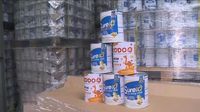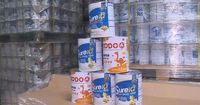On April 19, 2025, the Ministry of Industry and Trade in Vietnam issued an urgent directive following the alarming discovery of nearly 600 types of fake milk products. This significant action comes in the wake of a crackdown on a network producing counterfeit milk powder primarily targeting vulnerable populations, including patients, children, and pregnant women.
The directive, officially known as Telegram 2755/CD-BCT, was dispatched to the People’s Committees of various provinces and cities, the Department of Domestic Market Management and Development, and local Departments of Industry and Trade. Minister Nguyen Hong Dien, who also serves as the Deputy Head of the National Steering Committee 389, underscored the critical need for enhanced monitoring and control over products that directly impact public health, such as milk, medicines, and health-protecting foods.
In his communication, Minister Dien expressed concern over the recent surge in the production and distribution of fake milk, counterfeit medicines, and fraudulent health supplements across multiple localities. He highlighted that these illicit activities have persisted for years, posing a significant risk to public health.
The Ministry's directive mandates local authorities to swiftly review and enforce compliance with the law among businesses dealing in these essential products. This includes the immediate recall and strict handling of counterfeit and substandard goods in accordance with legal regulations. Furthermore, it instructs local governments to bolster food safety inspections and combat fraudulent trade practices that violate consumer rights.
In addition, the Ministry emphasized the importance of collaboration among various levels of government, social organizations, and the public in identifying and reporting violations. Local authorities are encouraged to develop rigorous post-inspection plans for food production and sales establishments, particularly those concerning products listed in Appendix II of Decree 15/2018/ND-CP, which outlines regulations for food safety.
As part of the crackdown, authorities have uncovered that from August 2021 to April 2025, individuals established Rance Pharma Company and Hacofood Group to manufacture and market fake milk powder. These companies produced a staggering 573 brands, chiefly aimed at individuals with diabetes and kidney issues. To disguise their operations, they also formed nine satellite companies responsible for product registration and distribution.
During recent operations, law enforcement searched 19 locations and seized 26,740 cans of milk powder across 84 different products, along with numerous documents and evidence related to the illegal activities. This seizure not only highlights the scale of the counterfeit operations but also the urgent need for regulatory oversight in the food and health sectors.
The Ministry of Industry and Trade is also calling for increased public awareness campaigns to educate consumers and businesses on food safety, which is crucial for protecting community health and stabilizing essential goods markets. The directive outlines specific measures aimed at enhancing food safety assurance, including rigorous checks on advertisements, especially those appearing in media, social networks, and e-commerce platforms.
As the government intensifies its efforts to combat the production and distribution of counterfeit products, Minister Dien reiterated the necessity for local authorities to be vigilant in monitoring market fluctuations and to report any significant changes in the availability of essential goods. This proactive approach aims to ensure that the needs of consumers are met while safeguarding their health.
Moreover, the Ministry has directed local Departments of Industry and Trade to implement area management strategies, focusing on small retail channels, unofficial agents, and online sales platforms, which are often hotspots for counterfeit goods. By doing so, they aim to mitigate the risks associated with low-quality products entering the market.
The recent crackdown on fake milk and related products serves as a stark reminder of the ongoing challenges in ensuring food safety and consumer protection in Vietnam. It highlights the critical role of regulatory bodies and the need for a collaborative approach involving various stakeholders to effectively address these issues.
In conclusion, the Ministry of Industry and Trade’s urgent directive reflects a significant step towards safeguarding public health and ensuring the integrity of food and health-related products in Vietnam. As authorities ramp up their efforts to combat counterfeit goods, public awareness and cooperation will be vital in creating a safer marketplace for all consumers.


